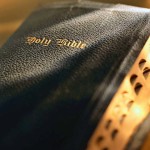On Mondays, I answer questions frequently asked by those considering a return to the Catholic Church. How do I know this stuff? I was away for more than 30 years myself, and am the co-author of When They Come Home: Ways to Welcome Returning Catholics, a book for pastors and parish leaders interested in this ministry.
Is it true that Catholics aren’t supposed to read the Bible? Why not?
To the contrary, the Bible is a big deal to our Church. That’s why our Masses contain readings from one of the Gospels, a psalm, an Old Testament reading, and on Sundays and other special days, a reading from the epistles. Popes as far back as Pius VI in 1778 and Leo XIII in 1893 encouraged Catholics to study the Bible. So did the Second Vatican Council.
We are cautioned, however, not to look to Sacred Scripture alone in informing our faith journey. As Catholics, we also learn  through Apostolic Tradition—the living transmission of teaching from the apostles through our Church leaders today. Both that Tradition and Sacred Scripture “must be accepted and honored with equal sentiments of devotion and reverence,” the Catechism advises.
through Apostolic Tradition—the living transmission of teaching from the apostles through our Church leaders today. Both that Tradition and Sacred Scripture “must be accepted and honored with equal sentiments of devotion and reverence,” the Catechism advises.
It’s true that Catholics still aren’t as likely as other Christians to read the Bible. A 2008 survey found that 44 percent of Catholics rarely or never read it, compared with 7 percent of evangelical Christians and 13 percent of other Protestants. Catholics who attend church at least twice per month also were far less likely to reflect at least daily on Scripture’s meaning in their lives or to participate in a Bible study or other small-group faith activity. However, 92 percent of Catholics said they believe the God of the Bible is the one true God—very close to the 98 percent of evangelicals and 94 percent of other Protestants who held that view.